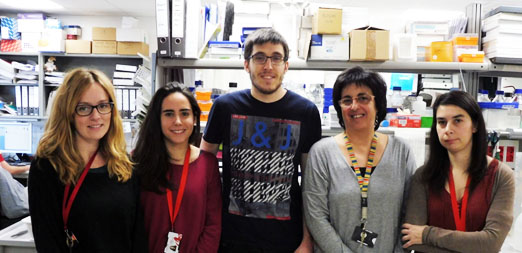The results of preclinical studies in mouse and PDX models show that PDGFR and CXCR4 inhibitor drugs, currently used for the treatment of other types of cancer, could be effective in treating this type of skin cancer
A therapy based in inhibitors as imatinib or plerixafor, drugs already available in clinical settings to treat other tumor types is effective to fight the metastasis of most aggressive and recurrent skin carcinomas. This is one of the conclusions reached by researchers of Dr Muñoz’s team from the Bellvitge Biomedical Research Institute (IDIBELL) in their latest work, recently published in Oncogene. The study was led by researchers Adrià Bernat, Pilar Simón and Victoria da Silva (IDIBELL), in collaboration with researchers from Bellvitge University Hospital and the ProCURE program (IDIBELL – ICO).
Squamous cell carcinoma is the second most frequent skin cancer. Most of these cancers are successfully treated by surgery, but a subset of patients develops recurrent tumors that show an aggressive and invasive growth, and a high-risk of metastasis. Currently, these advanced tumors are treated with conventional chemotherapy and/or radiotherapy, but these treatments yield little clinical benefits.
It was already known that a population of cancer cells, identified as cancer stem cells, is responsible for tumor growth and metastasis in most of tumors. Previous studies of Dr Muñoz’s team proved that cancer stem cells change during the progression of non-metastatic to metastatic carcinomas. However, the mechanisms that promote the invasion and dissemination of these cells in advanced skin carcinomas were unclear.
Now, Dr Muñoz’s team studies show that cancer stem cells of advanced skin carcinomas strongly induce the expression of SDF-1 as a consequence of an aberrant activation of PDGFR signaling. SDF-1 is a secreted protein that binds and activates CXCR4 receptors, which can be found in the membranes of cancer stem cells. “We observed that the activation of CXCR4 enhances the invasion capability of these cancer cells and the development of lung metastasis in mouse models of advanced skin squamous carcinomas”, Dr Muñoz explains. “Therefore, these studies demonstrated that the coordinated activation of PDGFR and CXCR4 pathways in cancer stem cell induce metastasis”, she adds.
“Then, we wanted to know if these pathways were also active in cancer cells from patients, which could open new therapeutic opportunities to block metastasis” says Adrià Bernat. To evaluate the relevance of SDF-1/CXCR4 and PDGFR pathways in patient tumors, they used PDX (patient-derived xenographs) models that were generated by engrafting samples of patient donated advanced carcinomas in immunodeficient mice. “We observed that treatment of patient tumors with specific inhibitors of PDGFR (imatinib) or CXCR4 (plerixafor) blocked the lung metastasis development” says Dr. Muñoz.
“Therefore, the results of these pre-clinical studies indicate that PDGFR and CXCR4 inhibitors, which are drugs that are already being used for the treatment of other cancer types, may be used to treat patients with advanced and metastatic skin carcinomas, in order to fight metastatic disease and increase the survival of these patients” she concludes.
This study was funded by the Spanish Ministry of Science and Innovation and CERCA (Generalitat de Catalunya).

